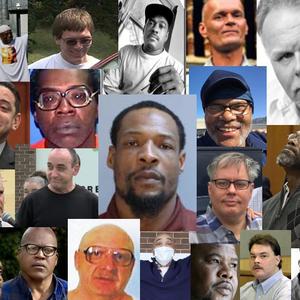
Photo of Khalil Allah, Courtesy of Khalil Allah’s legal team
On September 19, 2024, attorneys for Khalil Allah, formerly known as Freddie Eugene Owens, filed an emergency motion for a stay of execution after receiving a signed affidavit from his codefendant in the 1997 shooting death of Irene Graves that Mr. Allah “was not present” during the crime. Just two days ahead of Mr. Allah’s scheduled execution, Steven Golden, who was also charged in Ms. Graves’ death, recanted his trial testimony and said that Mr. Allah “is not the person who shot Irene Graves” and he “was not present” during the robbery. In the affidavit, Mr. Golden added that during police questioning, he was under the influence of drugs and was pressured into writing a statement implicating Mr. Allah. “I substituted [Mr. Allah] for the person who was really with me,” Mr. Golden wrote, adding that if he identifies the “real shooter,” he fears “his associates might kill” him. Mr. Golden was also given a plea deal that ensured he would not face the death penalty if he testified against Mr. Allah, which was undisclosed to the defense team. Despite the admission that Mr. Golden lied about Mr. Allah’s involvement at his trial, the South Carolina Supreme Court ruled the same day that Mr. Allah’s execution, scheduled for September 20, 2024, will proceed.
South Carolina Attorney General Alan Wilson said that Mr. Golden’s affidavit is not credible and does not warrant a new trial for Mr. Allah. He added that there is additional evidence pointing towards Mr. Allah’s guilt, alleging that he confessed to shooting his mother and girlfriend. However, attorneys for Mr. Allah argue that his mother “disavowed” a statement she signed for police suggesting Mr. Allah had confessed. In the emergency motion, Mr. Allah’s attorneys wrote that “this court has the power and the responsibility to ensure that the state of South Carolina does not kill one of its citizens for a crime he did not commit.” The state supreme court justices agreed with the attorney general’s office, and stated that Mr. Golden’s statement is “squarely inconsistent” with his past testimony, and that there is “no indication of the circumstances under which [Mr.] Golden was asked to sign his most recent affidavit.”
Mr. Allah’s scheduled execution would be the first execution conducted in South Carolina in 13 years. Mr. Allah was given the opportunity to elect between lethal injection, electrocution, or firing squad but he declined to choose, citing his Muslim faith. His attorney was given the authority to choose the execution method and chose lethal injection. Mr. Allah, who was 19 at the time of the crime, has long maintained his innocence. At trial, the prosecution presented no forensic evidence connecting him to the shooting. Surveillance footage showed two masked men with guns in the convenience store, but they could not be identified. The state’s case largely relied on the testimony of Mr. Golden, who now admits he lied. “I don’t want [Mr. Allah] to be executed for something he didn’t do,” Mr. Golden wrote in the affidavit, adding that “this has weighed heavily on my mind and I want to have a clear conscience.”
Mr. Allah has also asked Governor Henry McMaster to grant him clemency. No South Carolina governor has ever granted a death row prisoner clemency in the modern era of capital punishment, and Gov. McMaster has indicated he will announce his decision just minutes ahead of Mr. Allah’s scheduled execution. Among other issues, Mr. Allah’s clemency petition notes that he was just 19 at the time of the killing, and sustained brain damage from physical and sexual violence while in a juvenile prison. “Because Khalil’s youth and traumas prevented him from functioning as an adult, it is unjust to punish him as one,” his attorneys wrote. Reverend Hillary Taylor, the Executive Director of South Carolinians for Alternatives to the Death Penalty, said that the issues in Mr. Allah’s case are evidence that “the death penalty is not given to the ‘worst of the worst,’ it is given to the people who are least able to represent themselves in court. That is extremely unjust.” Rev. Taylor added that “Khalil should not have to die for somebody else’s wrongdoing. That is not accountability.”
Ensley Graves-Lee, Irene Graves’ daughter, in an interview, said that recent developments in the case have taken a toll on her family. “I understand that it is probably difficult for the other side, and I’m sure they would do anything to save someone they love,” said Ms. Graves-Lee. “I have to remind myself that I had no choice in any matter. I was 10 when she died and 12 when the verdict came…I had no choice in the death penalty at all.” She told reporters that she feels as though she is “preparing for a funeral…I don’t know if there’s closure after it, but I’m just trying to get past this part that was already decided for me.”
Five other death row prisoners in South Carolina have exhausted their appeals, and the state Supreme Court has authorized executions to be carried out in five-week intervals. South Carolina has scheduled an execution date for Marion Bowman on November 29, 2024.
Sam Levin, South Carolina to execute man despite bombshell admission from key witness, The Guardian, September 20, 2024; Sam Levin, ‘He didn’t do it’: days before execution in South Carolina, key witness says he lied, The Guardian, September 19, 2024; Jeffrey Collins, South Carolina death row inmate asks governor for clemency, Associated Press, September 18, 2024.
Innocence
Nov 25, 2024

Earwitness Podcast Creator Beth Shelburne on Toforest Johnson’s Case
Innocence
Oct 23, 2024

